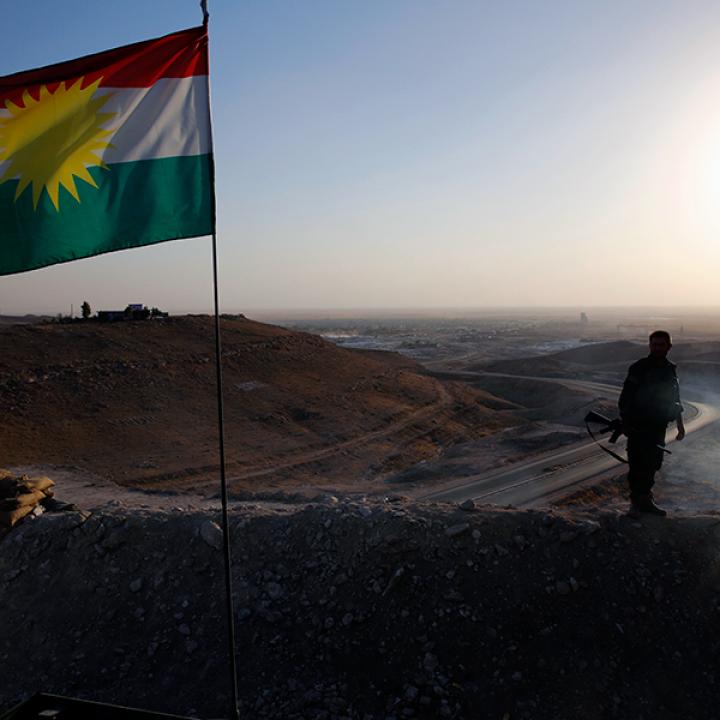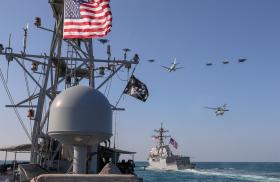
- Policy Analysis
- Fikra Forum
A Family Affair: Rifts in the Talabani Family Highlight the Kurdistan Region of Iraq’s Political Weaknesses

The ongoing rift between PUK party leaders Bafel and Lahur Talabani indicates potential shifts in KRI politics, and likely drivers of continued regional instability.
The Patriotic Union of Kurdistan (PUK) has faced a major leadership crisis since PUK leader Bafel Talabani began efforts to oust Lahur Talabani, his co-leader and cousin. The two were selected as party co-leaders in February 2020 after the death of Bafel’s father, Jalal Talabani—the former Iraqi president and founder of the PUK, who served as PUK party leader for 42 years. Three years after Jalal Talabani’s death, the party has been unable to establish a charismatic leader capable of maintaining party unity. The turbulent co-leadership system has now proved unsustainable, demonstrating the weaknesses of the KRI’s family-based political system.
The PUK is the second-largest party in the Kurdistan Region of Iraq, and is the historic rival of the larger and politically powerful Kurdistan Democratic Party (KDP). Initially, Bafel and Lahur aimed to work together to offset the gains of the KDP, which had been on the rise since Jalal Talabani fell ill in 2012. During the past month, however, the Talabani’s backstage rivalry has become the main event, with Bafel directing a series of moves aimed at removing Lahur from power.
First, Bafel temporarily stripped Lahur of co-leadership duties and ousted pro-Lahur officials from leadership positions. Security forces then raided pro-Lahur media outlets. Sulaymaniyah’s judicial system issued an arrest warrant for Lahur and his two brothers, including Polad Talabani, the former head of a counterterrorism unit.
Bafel’s efforts have enjoyed the support of several family members and key party officials, including his younger brother Qubad Talabani—the Deputy Prime Minister of KRI. He is likewise supported by long-time PUK officials Jaafar Sheikh Mustafa, Vice President of the KRI, and Kosrat Rasul Ali, the leader of the Supreme Political Council of the PUK, who together control the largest number of party-affiliated Peshmerga forces in Sulaymaniyah.
In response, Lahur has said that while he was asked to leave Sulaymaniyah, he will “not leave my nation until my last breath.” Photos circulated on social media show Lahur sitting at home alongside armed men, with a large crowd of people waiting outside his house, suggesting the potential of armed conflict between the men loyal to the two party leaders.
Although Bafel Talabani now seems to control the party and maintains the election alliance that the PUK formed with the reformist Goran (Change) Movement, the current leadership crisis demonstrates that the party has lost its capacity to resolve internal issues. Even if the PUK manages to consolidate around Bafel, it will take significant time and effort for it to contest the KDP. Absent a sudden reconciliation between the two, Bafel’s ongoing purge of Lahur loyalists is likely to further destabilize party discipline, unity, and trust. The rift may even cause armed conflict between PUK-affiliated security, intelligence, and Peshmerga forces with loyalties to the opposing sides.
Furthermore, the current crisis may raise doubts among PUK party members regarding the Talabani-led leadership system. Party members may vie to replace the Talabanis as PUK co-leaders, or may leave the PUK and form new parties. This is, in fact, how Goran was founded; former PUK member Nawshirwan Mustafa established the party in 2009 after criticizing the Talabani family’s leadership.
Internecine fighting within the PUK only further complicates an already unstable political situation in the KRI. Disunity, infighting, and accusations of betrayal between the PUK and the KDP have long driven instability among the Iraqi Kurds. Since the PUK-affiliated Peshmerga retreated from Kirkuk in October 2017 in the midst of the KRG’s failed bid at independence from Iraq, the KDP has accused the PUK of collaborating with Iranian General Qasem Soleimani and the Baghdad government. It is looking for revenge against the Talabani family leadership, and sees the rift as an opportunity to focus on institutionalizing control in Erbil, the capital of the KRI and the KDP’s traditional base, along with the district capital of Duhok, while its rival is distracted and weakened.
On the other hand, the KDP may see Bafel’s ascension in a positive light. Bafel Talabani has met with KDP officials on multiple occasions since the 2017 Kirkuk retreat, and appears to have repaired his relations with the Barzani leadership. Bafel supporters Quad Talabani and Kosrat Rasur Ali are likewise on good terms with KDP officials. In contrast, Lahur Talabani has maintained his anti-KDP stance—pushing the PUK to implement anti-KDP policies including increasing autonomy from Erbil and prioritizing Baghdad instead. Lahur has likewise accused the KDP of involvement in Bafel’s anti-Lahur purge.
While these facts suggest that the KDP might support Bafel in his rivalry against Lahur, its involvement in an internal PUK crisis will heighten distrust of the KDP in Sulaimaniyah. Therefore, the KDP is likely to maintain a neutral position with regard to the Talabani rift, even as Bafel’s sole leadership may usher in a period of détente in future PUK-KDP relations.
Regardless of the immediate outcome, the conflict itself is but one example of the perennial challenge haunting the KRI. In the nearly thirty years since it obtained greater autonomy from Baghdad, the fundamental problem for the KRI has been the dual-party political system, under which different Peshmerga, intelligence, security and governing units are controlled by varying party and family-affiliated factions.
If maintained, this system will continue to pose risks to the KRI political system and foster instability, as demonstrated by the current Talabani rift. In fact, the KDP may soon face a similar intra-family leadership crisis following the era of its charismatic longtime leader Masoud Barzani. As long as family relations are regarded as a key determinant in KRI policy, these issues will continue to divide and further complicate the politics of the KRI.


